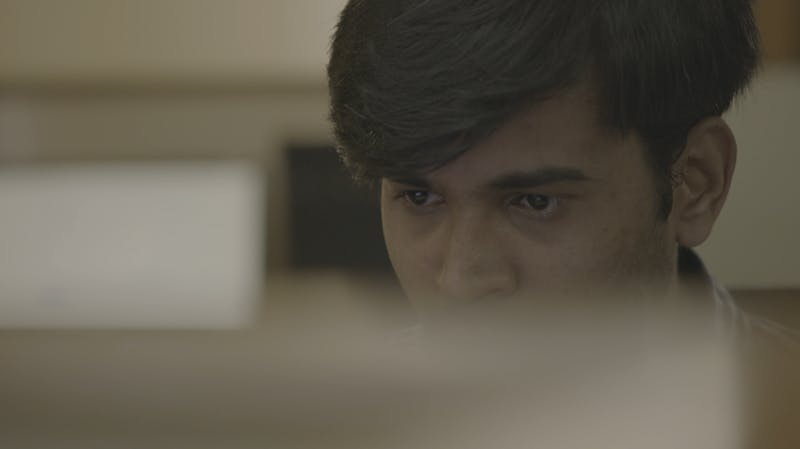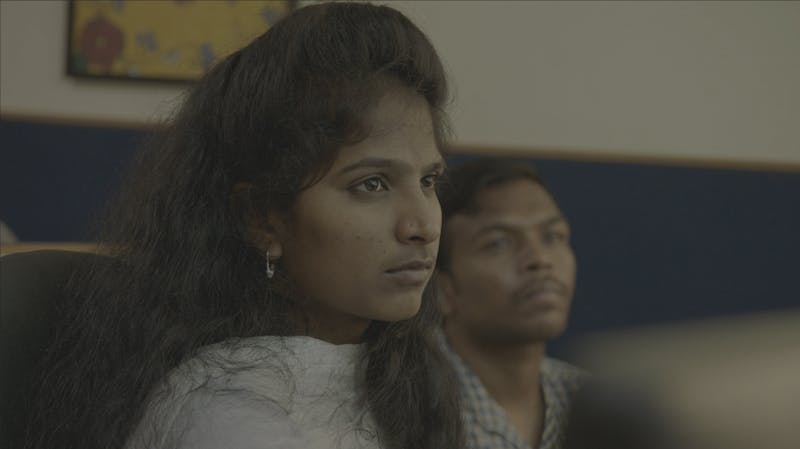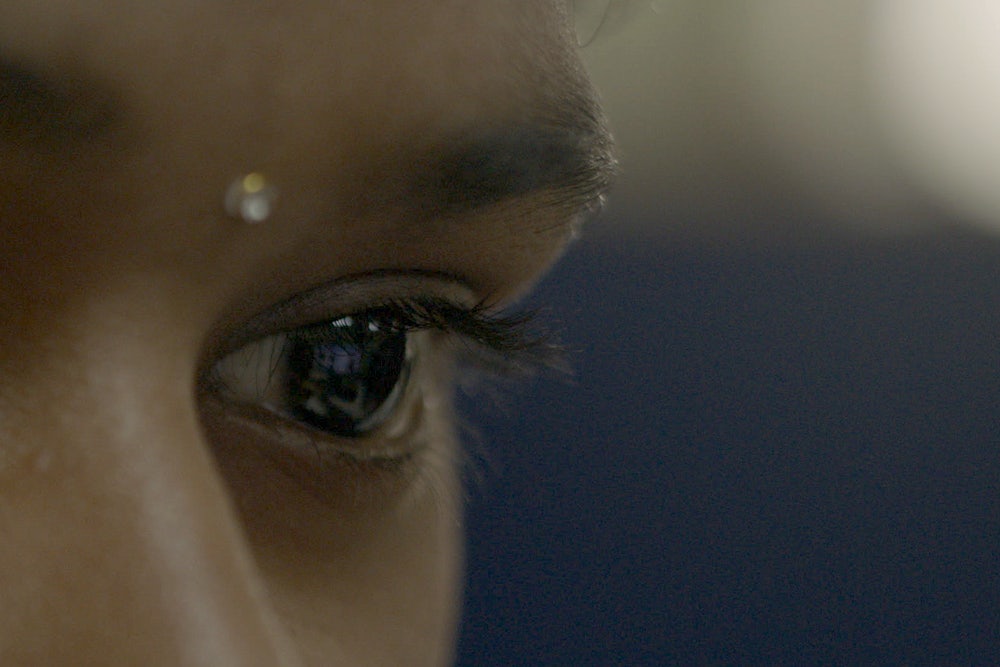The Moderators is a fly-on-the-wall glimpse into a training seminar on internet content moderation in India. A mere 20 minutes long, the documentary, directed by Ciaran Cassidy and Adrian Chen, derives from a 2014 investigative piece by Chen for Wired. “The Laborers Who Keep Dick Pics and Beheadings Out of Your Facebook Feed” was a deep dive into the hidden brigades of workers, mostly based in South and Southeast Asia, who manually remove offensive material from our social media. These laborers scrub indecent imagery of all kinds—the app Whisper’s rubric was “pornography, gore, minors, sexual solicitation, sexual body parts/images, racism.”
Much of Chen’s piece concentrated on the psychological toll that exposure to these images may be taking on these laborers, who are working in vast numbers. According to The Moderators, there are “up to 150,000” workers “scrubbing the world’s social media sites and mobile apps.” That is twice the number of employees of Google, and nine times that of Facebook.
In one interview for the Wired article, a former moderator named Maria in Manila (most of Chen’s research took place in the Philippines), told Chen that she was “really affected by bestiality with children.” But these artifacts of such shocking crimes were just part of her workday, so she took a break and kept going: “I have to stop. I have to stop for a moment and loosen up, maybe go to Starbucks and have a coffee.” Chen records that Maria laughs at the “absurd juxtaposition” of sex crime and latte.

That article and this new documentary both seek to attach human voices and human faces to the moderation process, which many American users assume to be somehow automatic. But The Moderators humanizes the moderation process in a very different way. The documentary has little of the shock value of Chen’s Wired article, despite treating the same subject. Instead of talking heads recounting their shocking experiences with graphic content, the documentary dwells only with a few people during their introductory training. We do not see them traumatized, at the other end of years of experience, nor do we see them vomiting over bestiality. Instead, we see the new moderators’ eyes widen and their uncertain giggles subside as the first rounds of pornography go up on the PowerPoint presentation behind their teacher.
“Has anybody here had a job before?” the teacher asks. Nobody replies, because they have not. It’s clear this has been an aspirational, self-improving move for the trainees. A title card flashes MONDAY, and we see the students sign a non-disclosure agreement. A sweet-eyed young man, basically a boy, talks determinedly about how he can get ahead through “concentration and mindset.” A pretty young woman has been searching for a job for five months. We don’t find out their names.
One of the training leaders explains that he is a good moderator because he is never “impacted, actually,” by the stuff he sees. “It’s just an image,” just the job. When he starts his training session he asks the group: “What do you know about content moderation?” They all stay silent. Do they really know nothing? Or are they all simply shy? Either way, we feel tenderly towards these workers, who are mostly pretty young, not yet sullied by the reams of child pornography awaiting them in their future.

The documentary’s cinematography is distinctive, atmospheric rather than entertaining. The palette is somehow both dark and pastel—dusty blues and dusky office walls frame subjects whose skin looks unflatteringly chalky in the office light. Long panning shots down the office contrast with symmetrical shots down its aisle. The blinds blow in the window’s wind; four square clocks mark out different time-zones on the walls. The camera often lingers in close-up on the subjects’ eyes, which are determined, tired, or fluttering.
The Moderators’ style recalls Laura Poitras’s work, and indeed the movie is associated with her. It premiered on April 14 at Field of Vision, a new “filmmaker-driven documentary unit” launched by Poitras, filmmaker AJ Schnack, and curator Charlotte Cooke, backed by the Pierre Omidyar-funded First Look Media. Poitras co-launched that platform’s The Intercept too, so the documentary has a strong flavor of the Oscar-winning documentary maker to it (she won in 2015 for the Edward Snowden portrait Citizenfour).
Compared to the Wired piece, Cassidy and Chen take a much less emotionally pornographic approach in this documentary. This makes the film a little boring, sadly. But it gives the feel of a real place, and a real office. You can almost hear the fans whirring. And these workers deserve to be the subject of documentary in and of themselves, not just as accessories to the filth they scrub from richer screens.
In his original Wired piece, Chen quotes a media studies scholar named Sarah Roberts who believes there is a “tacit” campaign to hide the practice of content moderation. That reluctance “goes to our misunderstandings about the internet and our view of technology as being somehow magically not human.” The gap in perception roughly divides between the global north and south, making Chen’s story an on-the-nose parable about the rich farming out their psychological trauma to the poor. The Moderators is a nuanced investigation into one bead on a long chain binding us to social media technology.
